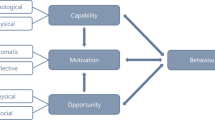Abstract
Purpose
Prehabilitation programs are effective in optimising patient’s functional reserve prior to surgery and increasingly associated with reduced postoperative complications. However, acceptability of programs among patients is largely unknown. This study set out to explore the acceptability of prehabilitation from the perspective of patients awaiting major cancer surgery.
Methods
Adult patients awaiting major gastrointestinal and urological cancer surgeries were surveyed. Patients were excluded if they were unable to complete the survey due to language, intellectual impairment and/or visual/hearing deficit. The survey was designed to explore categories related to patient demographics, level of physical activity and perceived enablers and barriers to prehabilitation.
Results
One hundred and three participants presenting to a pre-anaesthesia clinic completed the survey over a 5-month period, with 83% response rate. Approximately, half of the respondents were female (55%) and were currently physically active (53%). Fewer than one third (30%) felt they completed ‘enough exercise’. The majority of participants (83%) were unfamiliar with the concept of prehabilitation but two thirds (68%) were interested in such a program after explanation. The majority of participants (72%) indicated a strong preference to exercise in a home-based environment. Medical recommendation increased willingness to participate (p < 0.001), while program costs (p = 0.01) were potential barriers to participation.
Conclusion
Patients are willing to participate in prehabilitation prior to major cancer surgery but practical barriers and facilitators should be considered when designing prehabilitation programs to maximise patient commitment to facilitate improved postoperative outcomes.


Similar content being viewed by others
References
Carli F, Silver JK, Feldman LS, McKee A, Gilman S, Gillis C, Scheede-Bergdahl C, Gamsa A, Stout N, Hirsch B (2017) Surgical prehabilitation in patients with cancer: state-of-the-science and recommendations for future research from a panel of subject matter experts. Phys Med Rehabil Clin N Am 28(1):49–64
Barberan-Garcia A, Ubre M, Roca J, Lacy AM, Burgos F, Risco R, Momblan D, Balust J, Blanco I, Martinez-Palli G (2018) Personalised prehabilitation in high-risk patients undergoing major abdominal surgery: a randomized blinded controlled trial. Ann Surg 267(1):50–56
Boden I, Skinner EH, Browning L, Reeve J, Anderson L, Hill S, Robertson IK, Story D, Denehy L (2018) Preoperative physiotherapy for the prevention of respiratory complications after upper abdominal surgery: pragmatic, double blinded, multicentre randomised controlled trial. BMJ 360 (j5916)
Sebio Garcia R, Yanez Brage MI, Gimenez Moolhuyzen E, Granger CL, Denehy L (2016) Functional and postoperative outcomes after preoperative exercise training in patients with lung cancer: a systematic review and meta-analysis. Interact Cardiovasc Thorac Surg 23(3):486–497
Moran J, Guinan E, McCormick P, Larkin J, Mockler D, Hussey J, Moriarty J, Wilson F (2016) The ability of prehabilitation to influence postoperative outcome after intra-abdominal operation: a systematic review and meta-analysis. Surgery 160(5):1189–1201. https://doi.org/10.1016/j.surg.2016.05.014
Minnella EM, Liberman AS, Charlebois P, Stein B, Scheede-Bergdahl C, Awasthi R, Gillis C, Bousquet-Dion G, Ramanakuma AV, Pecorelli N, Feldman LS, Carli F (2019) The impact of improved functional capacity before surgery on postoperative complications: a study in colorectal cancer. Acta Oncol 58(5):573–578
Crandall K, Maguire R, Campbell A, Kearney N (2014) Exercise intervention for patients surgically treated for non-small cell lung Cancer (NSCLC): a systematic review. Surg Oncol 23(1):17–30. https://doi.org/10.1016/j.suronc.2014.01.001
Cho OH (2004) Effects of a comprehensive rehabilitation program for mastectomy patients. Taehan Kanho Hakhoe Chi 34(5):809–819
Ferriera V, Agnihotram RV, Bergdahl A, van Rooijen SJ, Awasthi R, Carli F, Scheede-Bergdahl C (2018) Maximizing patient adherence to prehabilitation: what do the patients say? Support Care Cancer 26:2717–2723
University of Southampton and Wessex Voices (2017) Patients’ experience of exercise and cancer. Informing ‘WESFIT’ Pilot Patient Involvement Report Feedback to participants
Saegrov S, Halding A-G (2004) What is it like living with the diagnosis of cancer? European Journal of Cancer Care 13:145–153
Booth ML (2000) Assessment of physical activity: an international perspective. Res Q Exerc Sport 71(2):s114–s120
Murnane A, Geary B, Milne D (2012) The exercise programming preferences and activity levels of cancer patients undergoing radiotherapy treatment. Supportive Care in Cancer 20(5):957–962. https://doi.org/10.1007/s00520-011-1167-z
Cancer Research UK (2008) Perceptions of risk survey 2008: key findings
Kippen R, James E, Ward B, Buykx P, Shamsullah A, Watson W, Chapman K (2017) Identification of cancer risk and associated behaviour: implications for social marketing campaigns for cancer prevention. BMC Cancer 17(550):550. https://doi.org/10.1186/s12885-017-3540-x
Santa Mina D, Petrella A, Matthew AG (2015) Enablers and barriers in delivery of a cancer exercise program: the Canadian experience. Curr Oncol 22(6):372–384
Lawson PJ, Flocke SA (2009) Teachable moments for health behaviour change: a concept analysis. Patient Education And Counseling 76(1):25–30. https://doi.org/10.1016/j.pec.2008.11.002
Acknowledgements
We would like to thank Amelia Hyatt and Allison Drosdowsky, the staff of the Pre-Anaesthetic Clinic and the patients of the Peter MacCallum Cancer Centre.
Funding
Jamie Waterland is supported in her research by a National Health and Medical Research Council (NHMRC) PhD Scholarship. The NHMRC was not involved in any decisions regarding this research.
Author information
Authors and Affiliations
Contributions
All authors contributed to the study conception and design. Material preparation was performed by Jamie Waterland, Hilmy Ismail, Babak Amin and Bernhard Riedel. Data collection, analysis and first draft preparation were performed by Jamie Waterland. Supervision was provided by Catherine Granger, Linda Denehy and Bernhard Riedel. All authors provided critical review of previous versions of the manuscript. All listed authors have seen and approved the final version of the manuscript.
Corresponding author
Ethics declarations
Conflict of interest
The authors declare that they have no conflict of interest.
Ethical approval
Ethics approval was gained from the Peter MacCallum Cancer Centre ethics committee (LNR/16/PMCC/142) prior to commencing recruitment.
Additional information
Publisher’s note
Springer Nature remains neutral with regard to jurisdictional claims in published maps and institutional affiliations.
Rights and permissions
About this article
Cite this article
Waterland, J.L., Ismail, H., Amin, B. et al. Patient acceptance of prehabilitation for major surgery: an exploratory survey. Support Care Cancer 29, 779–785 (2021). https://doi.org/10.1007/s00520-020-05547-1
Received:
Accepted:
Published:
Issue Date:
DOI: https://doi.org/10.1007/s00520-020-05547-1




